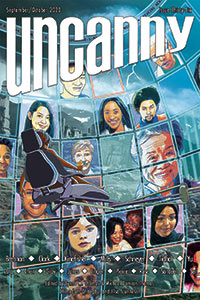Rich Horton Reviews Short Fiction: Uncanny and F&SF
The final issue of Uncanny’s sixth year is a particularly strong and SF-oriented one. In Samantha Mills‘s “Anchorage” a medical spaceship stops at an “anchorage” – an isolated pod where a woman lives a hermit-like existence. The story is told by Geneva, the AI running the medical ship, which allows us to slowly learn the backstory of the crewmembers, of dead Earth, and of course of Geneva, all modulated by what we hear from the anchoress in her pod. James Yu‘s “In the Space of Twelve Minutes” is told by Reuben, an astronomer researching the possible existence of a planet well beyond Pluto. His wife is a taikonaut, part of a Chinese mission to Mars. He has been provided an “avatar” of her – a robot with an AI based on his wife, and updated via a link to her – a contrivance to help maintain the stability of the taikonauts on their lonely mission. The story effectively mingles several SFnal themes: the search for life on Mars, the hope of exploration of the far reaches of the Solar System, and, perhaps most importantly, the issue of AI personality and the question of his wife’s avatar’s identity: is the avatar a part of Reuben’s wife, or her own person?
There’s fantasy here too, of course, in Lavie Tidhar‘s “Juvenilia“, in which a woman apparently suffering from the stress of her service in a war (presumably WWII, as the 1952 film Moulin Rouge is mentioned, but I’m not sure such specificity is meant) comes to Wildfell Hall, in rural England, to act as caretaker. The name of the hall, and the use of names like Agnes and Acton, signal that the juvenilia of the title must refer to that of the Brontës’, and before long the protagonist, straying, discovers mysterious people embroiled in a war of their own, involving Gondal. She meets a young man in the village as well, and eventually an old Gonadal woman named Anne…. It’s interesting stuff.
The top story, however, is “Laws of Impermanence” by Ken Schneyer, which is built around a truly striking – and very fruitful – concept. According to the laws of the title, written texts degrade over time, at a predictable rate. Thus it is important that certain texts – wills, notably – be maintained in multiple copies and regularly corrected. Other texts may change over time, sometimes even in worthwhile ways. The story interweaves clever discussions of the scientific history of understanding these Laws – from Aristotle to Newton to (of course!) Heisenberg – as well as the literary and religious implications of those Laws, with a dispute over a will that a law firm somehow failed to maintain in its original state, and with some letters (again, changing over time) concerning a woman’s fears of her divorced husband. The story is moving, even wrenching, and also simply intriguing, very clever, and quite original. We’ll see how it holds up under repeated rereading!
Two F&SF stories by writers new to me really stuck with me. Nadia Afifi‘s “The Bahrain Underground Bazaar” is told by an older woman dying of cancer. Zahra is one of the few people who doesn’t use the NeuroLync technology that enables instant communication and other conveniences and that also allows recordings to be made of one’s brain state. As her health declines she has been visiting the bazaar to experience dubious recordings of people dying in virtual immersion chambers. She becomes intrigued by a recording of a Bedouin woman who had impulsively flung herself to her death on the rocks of the ancient city Petra. Zahra becomes obsessed enough to sneak away to Petra to try to learn more about this woman – and, perhaps inevitably, learns more about herself, really.
“How to Burn Down the Hinterlands” by Lyndsie Manusos is announced as a story written in angry reaction to certain old fantasy tropes, and at first I admit I was not sure that’s what I needed to read (again!)… but I started the story and was almost immediately entranced. Faro is a woman whose mother was a great blacksmith, creator of a magical sword – and for her pains she was killed. Faro sublimates her rage at the loss of her mother (and perhaps her father too, dead in a senseless war), and instead dutifully grows up to be a great blacksmith. Inevitably, the time comes when the King sends his Hand – and the Hand’s fellow warriors – to ask of Faro a new magical sword. Perhaps Faro has the skill to achieve this, but why should she, knowing her likely fate? And how should she deal with the Hand and his team, who will make sure she does as asked? The answers are, on the one hand, much as one might expect, but also quite different. At any rate, they lead to an involving story.
I’ll add that I don’t always mention Albert E. Cowdrey‘s contributions, in part because they are so reliably enjoyable that it hardly seems necessary to tell people that, but I did like “The Tale of Two Witches” particularly well. An older woman veteran, Rosie Merckel, is pushed to figure out what was behind a series of grisly murders involving a somewhat unsavory local family, the Crownes, when her great-nephew disappears. What she finds is really scary, as a mysterious woman who had been nanny to the Crownes’ children has also disappeared – indeed it turns out that lots of children have disappeared. This is a nicely turned crime/horror story, with some creepy family dynamics, and some sweetness, too.
Recommended Stories
“The Bahrain Underground Bazaar”, Nadia Afifi (F&SF 11-12/20)
“Burn Down the Hinterlands”, Lyndsie Manusos (F&SF 11-12/20)
“Anchorage”, Samantha Mills (Uncanny 9-10/20)
“Laws of Impermanence”, Kenneth Schneyer (Uncanny 9-10/20)
“Juvenilia”, Lavie Tidhar (Uncanny 9-10/20)
“In the Space of Twelve Minutes”, James Yu (Uncanny 9-10/20)
Rich Horton works for a major aerospace company in St. Louis MO. He has published over a dozen anthologies, including the yearly series The Year’s Best Science Fiction and Fantasy from Prime Books, and he is the Reprint Editor for Lightspeed Magazine. He contributes articles and reviews on SF and SF history to numerous publications.
This review and more like it in the November 2020 issue of Locus.
 While you are here, please take a moment to support Locus with a one-time or recurring donation. We rely on reader donations to keep the magazine and site going, and would like to keep the site paywall free, but WE NEED YOUR FINANCIAL SUPPORT to continue quality coverage of the science fiction and fantasy field.
While you are here, please take a moment to support Locus with a one-time or recurring donation. We rely on reader donations to keep the magazine and site going, and would like to keep the site paywall free, but WE NEED YOUR FINANCIAL SUPPORT to continue quality coverage of the science fiction and fantasy field.
©Locus Magazine. Copyrighted material may not be republished without permission of LSFF.


 Uncanny
Uncanny 




